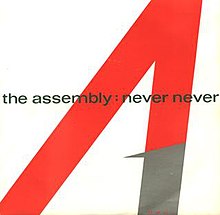
The Undertones are a rock band formed in Derry, Northern Ireland in 1974. From 1975 to 1983, the Undertones consisted of Feargal Sharkey (vocals), John O'Neill, Damian O'Neill, Michael Bradley and Billy Doherty (drums). Much of the earlier Undertones material drew influence from punk rock and new wave; the Undertones also incorporated elements of rock, glam rock and post-punk into material released after 1979, before citing soul and Motown as the influence for the material released upon their final album. The Undertones released thirteen singles and four studio albums between 1978 and 1983 before Sharkey announced his intention to leave the band in May 1983, citing musical differences as the reason for the break up.

"Mr. Roboto" is a song by American rock band Styx, released as the lead single from their eleventh studio album, Kilroy Was Here (1983). It was written by band member Dennis DeYoung. In Canada, it went to #1 on the RPM national singles chart. It entered on both the US Billboard Hot 100 and US CashBox Top 100 on February 12, 1983. On April 30 the song peaked at #3 on Billboard,but fared better on Cash Box, where it reached #1.

Seán Feargal Sharkey is a singer from Northern Ireland. He was the lead vocalist of punk band The Undertones in the 1970s and 1980s and a solo artist in the 1980s and 1990s. His 1985 solo single "A Good Heart" was a number-one hit in the United Kingdom, Australia, Belgium, Ireland, and the Netherlands. After becoming less musically active in the early 1990s, he has performed various roles supporting the UK's commercial music industry, winning several awards and honours for his work in that area.

"Uptown Girl" is a song written and performed by American musician Billy Joel from his ninth studio album An Innocent Man (1983), released in September 1983 as the album's second single. The lyrics describe a working-class "downtown man" attempting to woo a wealthy "uptown girl". The 12" EP has the tracks "My Life", "Just the Way You Are" and "It's Still Rock and Roll to Me", whereas some 7" single versions featured "Careless Talk" as a B-side.

"Heaven Is a Place on Earth" is a single by American singer Belinda Carlisle from her second studio album, Heaven on Earth (1987). Written by Rick Nowels and Ellen Shipley, the song was released as the lead single from the album on September 14, 1987, and it reached number one on the US Billboard Hot 100 on December 5, 1987, becoming Carlisle's only US chart-topper to date. A month later it peaked at number one in the United Kingdom, where it held the top spot of the UK Singles Chart for two weeks. In Australia it peaked at number 2. It is considered to be Carlisle's signature song.

"Babe" is a song by the American rock band Styx. It was the lead single from the band's 1979 triple-platinum album Cornerstone. The song was Styx's first, and only, US number-one single, spending two weeks at No. 1 in December 1979, serving as the penultimate number-one single of the 1970s. "Babe" also went to No. 9 on the Adult Contemporary chart. It additionally held the number-one spot for six weeks on the Canadian RPM national singles chart, charting in December 1979 and becoming the opening chart-topper of the 1980s. It was also the band's only UK Top 40 hit, peaking at No. 6. It also reached No. 1 in South Africa.

"Baby Jane" is a 1983 song by British singer Rod Stewart, written by Stewart and Jay Davis released as the lead single from his twelfth studio album Body Wishes. Produced by Stewart, Tom Dowd, George Cutko and Jim Cregan, it was his most successful single since "Da Ya Think I'm Sexy" in 1978, peaking at No. 1 in the UK remaining at the top of the chart for three weeks. In the US, the song was also a big hit, peaking at no. 14 on the Billboard Hot 100 chart. The single also charted highly in Australia, peaking at no. 10.

"Separate Lives" is a 1985 song recorded by Phil Collins and Marilyn Martin and featured on the soundtrack to the motion picture White Nights. It reached No. 1 on the US Billboard Hot 100 and Adult Contemporary charts as well as in Canada and Ireland. It reached No. 4 on the UK Singles Chart, and was certified silver by the British Phonographic Industry.
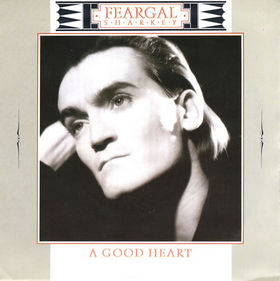
"A Good Heart" is a song written by Maria McKee and recorded by Northern Irish singer Feargal Sharkey, released as the first single from his self-titled debut album. It was released in September 1985 and became a number-one hit in the United Kingdom, Australia, Belgium, Ireland, and the Netherlands.

"Nikita" is a song by English musician Elton John from his 19th studio album, Ice on Fire (1985). It was released as the album's lead single on 4 October 1985, charting at number three on the UK Singles Chart, peaking at number seven in the United States, and reaching the top 10 worldwide, topping the charts of eight countries. The song features George Michael on backing vocals and Nik Kershaw on guitar.

"I Guess That's Why They Call It the Blues" is a song by English musician Elton John, with music by John and Davey Johnstone and lyrics by Bernie Taupin, released as the first single from John's 17th studio album Too Low for Zero. It was the first single since 1975's "Someone Saved My Life Tonight" to feature the classic lineup of the Elton John Band.

"Montego Bay" is a song co-written and performed by Bobby Bloom about the city in Jamaica of the same name. The song was a top ten hit for Bloom in the Fall of 1970 on both sides of the Atlantic. It reached No. 3 on the UK Singles Chart, No. 5 on the Canadian RPM 100 Singles Chart, No. 7 on the Australian Go-Set Singles Chart and No. 8 on the US Billboard Hot 100. The song was co-written and produced by Jeff Barry. In the master tape of the song, Bloom breaks into a chorus of "Oh, What a Beautiful Mornin'" at the end of the recording. The song features a whistler, as well as Jamaican instruments in a calypso style.
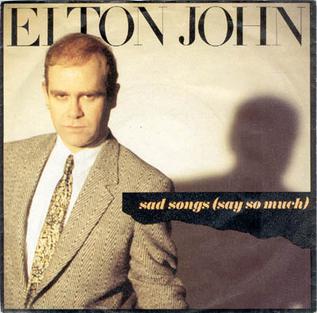
"Sad Songs (Say So Much)" is the closing track on English musician Elton John's 18th studio album Breaking Hearts, written by John and Bernie Taupin, released in 1984 as the lead single of the album. It reached No. 7 on the UK chart and No. 5 on the US Billboard Hot 100 chart. The song reached the Top 10 of many countries except in Germany and Italy where it reached the Top 20. The single version of this song appeared on the 1990 box set To Be Continued... and various versions of the 2007 compilation Rocket Man: The Definitive Hits.
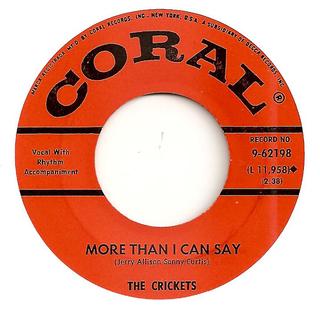
"More Than I Can Say" is a song written by Sonny Curtis and Jerry Allison, both former members of Buddy Holly's band the Crickets. They recorded it in 1959 soon after Holly's death and released it in 1960. Their original version reached No. 42 on the British Record Retailer Chart in 1960. It has been notably performed by singers Bobby Vee and Leo Sayer.

"I'd Love You to Want Me" is a song by American singer-songwriter Lobo. It was released in September 1972 as the second single from his second album Of a Simple Man.

"One Way Ticket" is a song written by Jack Keller and Hank Hunter. It was originally performed by American singer Neil Sedaka and popularized by British disco band Eruption.

"The Day I Met Marie" is a song by Cliff Richard, released as single in August 1967. The song was written by Hank Marvin and produced by Norrie Paramor.
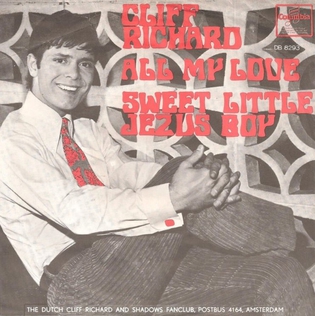
"Solo tu" is a song by Italian singer Orietta Berti, released as a single in April 1967. Whilst it did not chart, it was a finalist in that year's summer festival Un disco per l'estate. The song became better known after it was adapted into English as "All My Love", and covered by Cliff Richard later in 1967.

Passengers is a 1984 song by English musician Elton John that appears on his 1984 album Breaking Hearts, released as the second single of the album. The song reached number five on the UK chart, and reached the top ten in Australia, but was not released as a single in the US.
